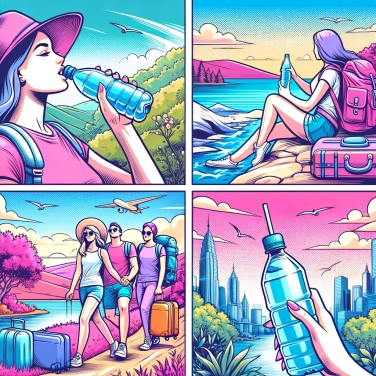Drinking bottled water while traveling can be essential to avoid stomach issues, as bottled water is typically treated to eliminate bacteria and pathogenic microbes present in tap water, reducing the risk of contamination and gastrointestinal infections.

Abroad, tap water can contain all sorts of microorganisms that are not very friendly for the stomach. We often talk about bacteria, viruses, or parasites that can trigger serious digestive issues like the infamous "traveler's diarrhea." In some countries, the quality of sanitary facilities or environmental pollution makes drinking water less safe, even if it looks clear and clean. Water treatment standards also vary quite a bit from one place to another, and the chlorine used for disinfection doesn't always eliminate all dangers. The result: drinking straight from the tap can quickly ruin your trip by giving you stomach pains, diarrhea, or vomiting.
Drinking bottled water abroad means choosing water with controlled and safe sanitary quality. Unlike many uncertain local waters, bottled water significantly reduces the risks of exposure to harmful microorganisms. It eliminates most risks associated with outdated or poorly maintained facilities. In short, you seriously reduce the risks of diarrhea, stomach aches, and other unpleasant intestinal surprises while traveling. It's simple and effective: you avoid troublesome health issues by opting for an easy and reassuring solution.
Bottled water helps avoid common pathogens when traveling, including bacteria like Escherichia coli (or E. coli) responsible for severe diarrhea, protozoa like Giardia that cause unpleasant digestive issues, and even certain viruses like rotavirus or hepatitis A virus, which lead to vomiting, abdominal pain, or fever. All these germs often come from water contaminated with fecal matter, which is very common when water treatment or sanitation is inadequate. Drinking exclusively bottled water significantly reduces this risk, as it typically undergoes rigorous purification processes before being sealed.
If you travel to an area where tap water is unreliable, you risk serious digestive issues. Poor quality water often contains pathogenic microorganisms that can directly cause frankly unpleasant symptoms like diarrhea, nausea, or even vomiting. Choosing to drink only bottled water ensures clean and safe water, significantly limiting these digestive problems. Bottled water generally comes from controlled sources, with strict quality standards, thereby reducing the risk of infection. In short, drinking bottled water is simple and saves you a lot of trouble during your trip.
Boiled water is an economical alternative to bottled water, but it must be boiled for at least one minute to effectively eliminate pathogens.
Even when tap water appears clean, it may contain microscopic parasites such as Giardia or Cryptosporidium, which can cause severe digestive disturbances.
Ice cubes served in drinks abroad can also cause digestive issues if they are made from contaminated water; always opt for ice made from purified water.
Nearly 80% of cases of traveler's diarrhea are caused by the consumption of contaminated water, according to the World Health Organization (WHO).
Yes, they can indirectly contaminate beverages or food that are consumed. To avoid this risk, it is recommended to opt for drinks without ice and foods that are cooked or peeled.
Even in small amounts, contaminated water used for brushing teeth can cause digestive issues. It is recommended to use bottled water, especially in areas where the potability is uncertain.
In this case, it is advisable to boil the water for at least one minute or to use disinfectant tablets specifically designed for water treatment before consumption.
Not all of them. It is essential to check that the bottle is properly sealed at the time of purchase and to avoid unknown brands or bottles with altered seals in order to prevent any health risks.
Boiling water helps kill many pathogens; however, it does not eliminate potential chemical contaminants. When water quality is in doubt, it is often better to use bottled water for optimal safety.

No one has answered this quiz yet, be the first!' :-)
Question 1/5